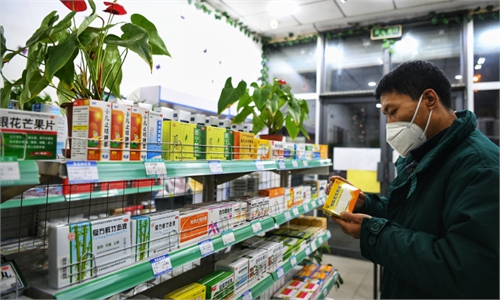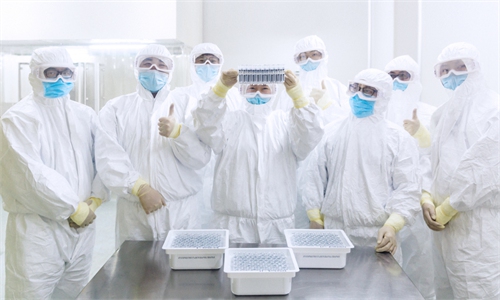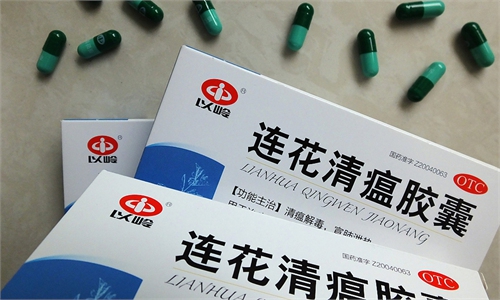China races to ensure medical supplies as COVID cases rise; 'problem likely to be solved in 10 days'
Advantage of new national system key to addressing bottlenecks
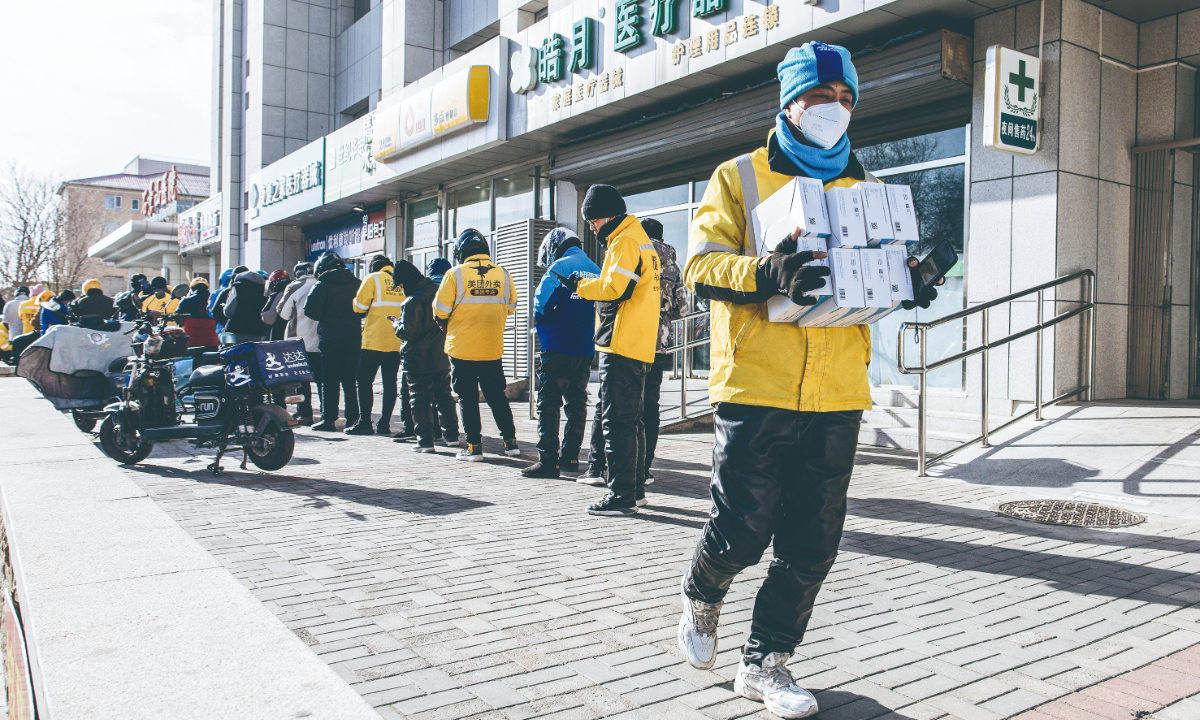
Delivery personnel dispatch COVID-19 antigen kits and medicines for fever, cold and cough as demand surges on December 8, 2022, after restrictions on drug purchases were lifted. Many pharmacies and drug producers are scrambling to ramp up supply in response. Photo: Li Hao/GT
Editor's Note:
After China released 10 optimized measures against COVID-19 and lifted some anti-epidemic restrictions, many localities across the country are recording a surge in infections. However, the overall epidemic as well as the social and economic situation remain stable thanks to the country's robust and proven industrial and supply chains. To illustrate how China's resilient industrial and supply systems offer a necessary guarantee for anti-epidemic efforts and how the overall improving epidemic situation underpins economic recovery, the Global Times is publishing a multipart series. This is the first installment which focuses on China's medical supplies.
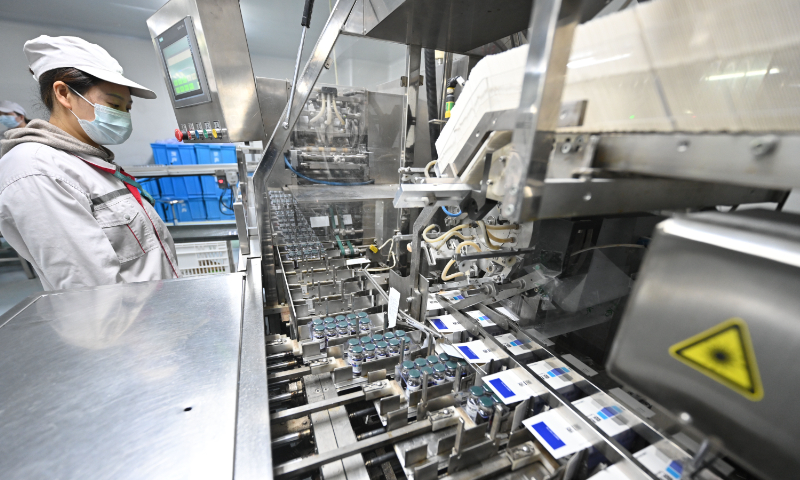
A workshop of Tanreqing Zhusheye (sputum-heat clearing injection) in Shanghai Photo: VCG
As Chinese localities and enterprises ramp up efforts to ensure the supply of fever and cold drugs, personal protection items and other much-needed goods, many factories are operating 24 hours a day to increase output, as the central government highlighted the urgent need to guarantee medical services and drugs essential to public health on Wednesday. An industry insider said the supply of necessary drugs is being ensured by the world's largest supplier of relevant raw materials, and the problem of a temporary strain on supply could be solved in around 10 days.
Over 160 industrial enterprises belonging to the China National Pharmaceutical Group Co (Sinopharm) are operating 24 hours a day to increase output, with the production capacity for key drugs expanding to three times that of normal levels, the group confirmed to the Global Times on Wednesday. Sinopharm is striving to meet people's demand for drugs by setting up a special working group to ensure the timely shipment of medicines to key regions, while also releasing large amount of essential drugs to the retail market.
Medicines for cold, fever, cough, and anti-bacterial and anti-inflammatory drugs have been in high demand in recent days due to the spike of infections across the country. The transaction volume of antigen self-test kits grew by 344 percent between November 28 and December 4 week over week, according to JD Health's data sent to the Global Times.
The platform said that JD Pharmacy has more than 100 million boxes of necessary medicines in its inventory or in shipment, which will be sold at their normal retail price. The firm has also partnered with several face mask manufacturers to transport face masks from production lines directly to JD's warehouses to improve supply chain efficiency.
Shenzhen-based communication service provider Montnets Group said during exchanges with investors via Shenzhen Stock Exchange on Wednesday that the company's subsidiary has over 10 production lines for manufacturing KN95 face masks with designed daily production capacity of up to 1 million masks, while also has more than 40 production lines for common face masks with a daily maximum output of up to 3 million.
"We have seen an apparent rise in orders and are trying the best to improve production capacity to meet market demand," the company said.
Local governments have also stepped up efforts to ensure supply of medical services and anti-pandemic goods. The Beijing Municipal government held a meeting on Monday, pointing to practicing the principle of people first and life first at the critical moment of anti-epidemic in the capital city, asking to ensure that medicines are kept at a stable price, and to optimize logistics to ship drugs to hospitals and drugstores as fast as possible, while also moving to crack down on price gouging.
The local health bureau of Northwest China's Shaanxi Province said at a press conference on December 9 that it has stockpiled more than 600 kinds of drugs, traditional Chinese medicines, biological products, medical devices and medical protection items worth 50 million yuan ($7.2 million), which could be released to market according to demand.
Supply ensured
"The temporary tight supply in China is mainly due a mass stockpiling of fever medicines out of panic over Omicron, after the authorities adjusted and optimized the response to the epidemic. The country's supply of fever and cold drugs is completely guaranteed," Wang Bo, deputy director of the China Pharmaceutical Enterprises Association, told the Global Times on Wednesday.
Most of the fever medicines and painkillers that a lot of people have stockpiled like Ibuprofen are commonly seen drugs that dozens and even hundreds of companies manufacture across China, Wang said, noting that China is the largest provider of raw materials for these medicines and thus the supply of relevant raw materials and preparations are guaranteed.
He projected that the problem of tight supply of common fever and cold drugs will ease soon, and there will be no shortage of drug, antigen self-test kits and other anti-epidemic essential within 10 days.
Zhou Jian, an official with the Ministry of Industry and Information Technology, said at a press conference on Wednesday that officials have given full play to the advantages of new national system to boost enterprises to swiftly and steadily increase production capacity, strengthen supply of key drugs and are striving to improve accessibility.
The ministry has deployed special representatives to enterprises to coordinate with local government agencies in helping key drug manufacturers solve logistics, labor, raw materials and other bottlenecks, and support their production at full capacity, according to Zhou.
It's worth noting that the country is taking actions to ease tight supply of medical resources by promoting Internet Plus medicine and health care to provide diagnosis for patients with COVID-19 symptoms and offer drugs offline through third-parties. For example, JD Health has introduced online anti-COVID clinic which offers 24/7 medical consultations. With an average response time of less than 30 seconds, this kind of telemedicine service is expected to provide much-needed assistance to the public in addressing the spike in infections.
"Overall, the country's supply of key medical products including antigen test kits, vaccines and face masks is sufficient. Due to low inventory in clinics amid few demand, there has been temporary short supply antigen test kits in some regions, but the output will swiftly increase along with continuous release of production capacity and people's demand will be satisfied," Zhou said.
